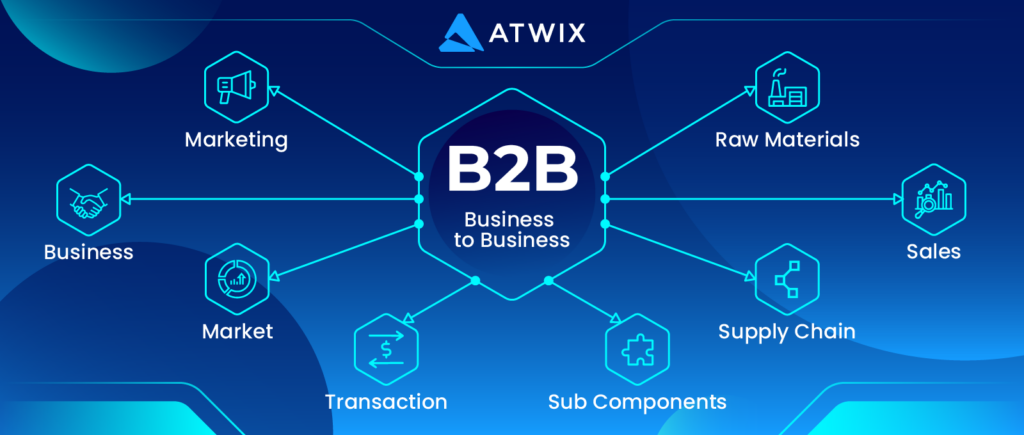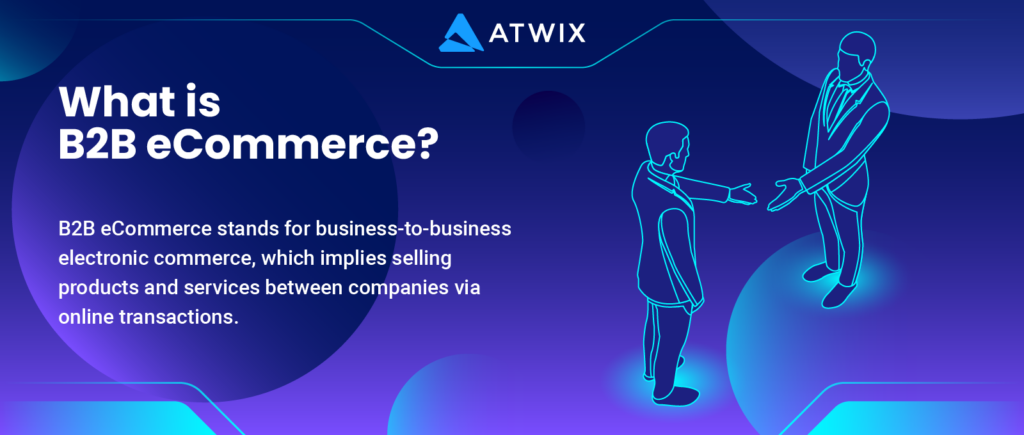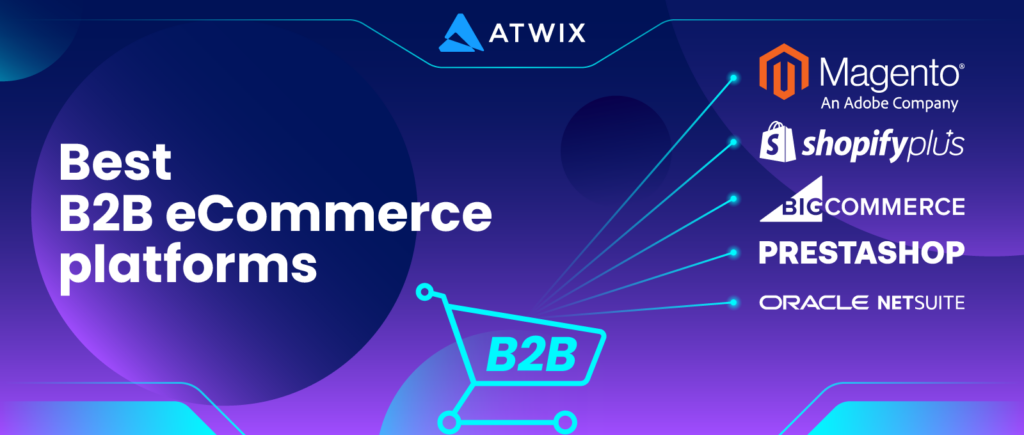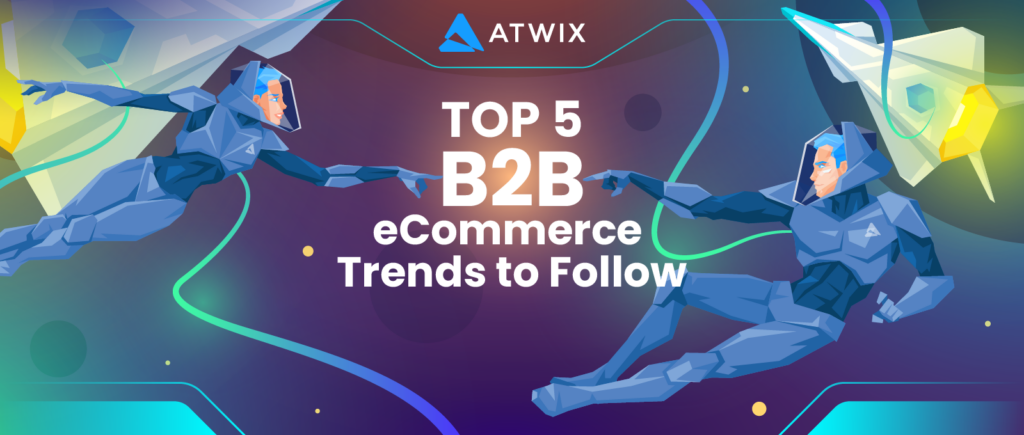The global B2B eCommerce market is more than five times larger than the B2C market, offering players significant revenue opportunities. Yet, to enter this segment, you need to understand your B2B buyers’ unique requirements. Breaking into B2B eCommerce, prepare for complex procurement processes, shipping constraints, and a greater focus on security and liability. The good news is that the right eCommerce platform for B2B can make your life much easier.

Atwix is a full-service eCommerce agency specializing in B2B platform development services. We power up digital transformation to overcome B2B selling challenges and deliver end-to-end implementations, design and development, performance optimization, maintenance, and support. Atwix helps clients of all sizes accomplish the impossible by providing exceptional outcomes in all aspects of their online B2B business.
This post will teach you the fundamentals of B2B eCommerce, top platforms, and current industry trends. We will examine the factors contributing to success in B2B online business and introduce Atwix as a reliable B2B eCommerce partner. Our cases illustrate how we helped our clients overcome industry barriers and improve metrics across the board.
The Basics of B2B eCommerce

Let’s start with the definition of B2B eCommerce and then dig deeper into its types, marketing and sales strategies, and customer service.
What Is B2B eCommerce?
B2B eСommerce stands for business-to-business electronic commerce, which implies selling products and services between companies via online transactions. Because orders are completed online, wholesalers, manufacturers, distributors, and other B2B sellers use digital technologies to improve their purchasing efficiency and effectiveness and solve ongoing customer challenges.
B2B transactions are often high-value, low-volume sales with fewer purchasers due to the nature of B2B eСommerce. Because B2B purchases are generally unique to each customer, you can negotiate pricing points. The sales cycle is often longer than in a typical B2C (business-to-customer) transaction due to the more significant amount of money, products, and decision-makers involved.
Types of B2B eCommerce
As a B2B company, you will almost certainly fall into one of the following categories. Each entity has benefits and downsides, and some businesses can fall into multiple categories at the same time.
B2B2C
B2B2C (business-to-business-to-consumer) eCommerce eliminates the typical middleman between B2B and B2C organizations, bringing enterprises into direct contact with the consumer. A wholesaler’s or manufacturer’s interaction with traditional B2B and B2C models best describes the B2B2C model.
In such cases, the wholesaler or manufacturer supplies products to the B2B, subsequently selling them to the end customer. In a B2B2C model, the wholesaler or manufacturer partners with the B2B to reach the customer. A B2B company then sells the manufactured products straight to the consumer. These transitions occur online in B2B2C eCommerce, frequently via Internet shops, an eCommerce site, or even apps. Amazon, for one, is a great example of a B2B2C business model.
Wholesalers
B2B businesses frequently buy things in bulk at a reduced cost, straight from manufacturers or distributors. Then, they resell products at a higher price to other businesses like retailers in bulk. This type of B2B is known as wholesale. Manufacturers can be considered wholesalers as well. Wholesale B2B models are in various industries, including retail, food service, construction, and medicine.
Traditionally, wholesale B2B transactions were conducted over the phone, by email, or through spreadsheet order forms. Now, everything in wholesale business is done digitally using B2B eCommerce software. The platform makes it easier for wholesalers to present products and delivers a more seamless buying experience.
Manufacturers
Manufacturers produce finished products on a large scale by combining parts and raw materials with manual labor and equipment. The final goods are sold to other manufacturers, suppliers, or distributors in a B2B business. Manufacturing eCommerce players are part of the B2B network but can also have their own eCommerce website. They can offer products directly to other businesses and customers via their website or a dedicated B2B eCommerce app.
The automotive sector is an excellent example of a B2B manufacturer. The manufacturer creates individual automotive parts, such as gasoline pumps and engines. The producer then sells these parts to an automobile firm, which assembles the car from the parts and sells it to the consumer.
Distributors
When the product is ready, the manufacturer can sell it to the end consumer. However, this leaves them with order management, packaging, and marketing tasks. Therefore, manufacturers tend to collaborate with a distributor to boost the exposure of the goods, increase sales, and move their product along the distribution channel.
B2B eCommerce for distributors aims to reduce the time between sale and delivery and to provide a customer experience that exceeds consumer expectations. The giants like Amazon, eBay, and Walmart demonstrate the enormous potential for distributors to sell online and achieve extraordinary growth. Furthermore, with Amazon setting the standard for automated, tailored experiences, distributors must adopt increasingly complex eCommerce technology to attract and retain customers.
B2B eCommerce Marketing and Sales Strategies
Before implementing any marketing or sales techniques, determine your ideal customer profile and buyer personas. What kind of business would most benefit from your product or service? It is critical to identify this first so that all marketing and sales efforts are geared toward the buyers most likely to purchase – as opposed to a broad approach, that risks getting lost in the noise.
Once you’ve laid the groundwork, consider the following B2B marketing and sales strategies:
- Educate your B2B clients. Providing helpful information about your product or industry in appealing formats entices new clients and persuades existing customers to buy more. Blogs, webinars, videos, and podcasts are influential in raising prospect awareness.
- Offer discounts and promotions: Specials on products and services can attract new customers, boost your brand, foster client loyalty, and serve as a competitive differentiator.
- Set up a referral program: One of the most effective ways to gain new consumers is through referrals. Ask satisfied customers to provide feedback on your product or service, and consider offering an incentive in exchange.
- Use search engine optimization (SEO): It is vital to use SEO tactics to ensure your company’s online presence ranks higher in search engines. It increases your company’s visibility online and makes it easier for potential clients to find you.
- Increase your visibility: Attend trade exhibitions and be active on social media platforms. Use cold calling, emails, affiliate marketing, or advertising to get your company’s name out there. Brand awareness is essential for attracting new customers and growing sales.
B2B Customer Service
The goal of B2B customer service is to increase customer retention by fostering trust in your company and what it has to offer. B2B customers have longer sales cycles, higher expectations, and more sophisticated requirements than B2C customers. Context and customer understanding are critical in B2B customer service. You must know your target audience, their aspirations, the challenges they confront, and how your product can help them achieve their goals.
B2B companies must prioritize customer service to succeed since they have essential contracts and must impress various stakeholders. To help you in this endeavor, we’ve compiled a list of best practices for boosting your B2B customer service strategy.
- Make your B2B client service proactive. Anticipate your buyers’ needs and resolve their issues before they arise. You can provide real-time updates on shipping and service interruptions. Collecting customer feedback also helps identify improvement areas.
- Clearly define your services and the expected outcomes. Documenting your service standards will establish realistic and measurable expectations and determine each party’s duties and responsibilities. It will help to build trust with your B2B customers.
- Offer various self-service options. You should invest in a robust B2B eCommerce platform with online chat, self-help knowledge bases, documentation, and customer portals. This way, you deliver a tailored and seamless online shopping experience.
- Personalize your B2B customer service experience. It enables businesses to cater their offerings to each unique client, making them feel appreciated and understood. Personalization leads to deeper customer relationships, boosting sales and profitability.
- Provide post-purchase support. Understanding what customers think, feel, and say about your organization after a purchase is critical for client retention. After the sale, maintain contact with your clients by email, phone, or social media.
Top B2B eCommerce Platforms
How to choose a B2B eCommerce platform? Consider product categories, design flexibility, Magento payment gateway integration, user experience, security, scalability, and price. Let’s review five popular eCommerce platforms that help address specific B2B client needs and demands.

Magento
Magento, now Adobe Commerce, is a prominent B2B eCommerce platform based on open-source technology. It lets sellers benefit from a flexible shopping cart system while controlling their website’s appearance, content, and operation. It has vast integrations and an extension library. Magento B2B Commerce provides all of the significant features of Magento’s B2C commerce platform, plus additional functionality for B2B sellers like managing numerous brands and partner accounts.
Top Magento B2B Commerce platform features include:
- Quick order options
- Customer segmentation
- Inventory management
- Requesting quotes
- Credit limit management
- Customer management
- Advanced security features
- Business intelligence.
Pricing: $25-40k/year
Shopify Plus
Shopify Plus is designed to benefit B2B eCommerce but also allows merchants to handle B2C sales. Every time business clients place an order, they can readily access company-specific information such as payment terms, preferred payment method, and wholesale discounts thanks to B2B Checkout. Shopify Plus is used by over 7,000 B2B eCommerce firms, including Nestle, Leese, Pepsi, and Bombas.
Shopify Plus’s standout features are:
- ERP and CRM integrations
- Over 100 payment providers
- Conversion optimization
- Personalization options
- Sending automated welcome emails
- Automated delisting of sold-out products
Pricing: starting at $2,000 per month.
BigCommerce
BigCommerce B2B eCommerce platform is popular among merchants looking for an easy-to-integrate solution. Integrations with ShipperHQ and Brightpearl are one of BigCommerce’s primary selling factors. It is an excellent solution for SME companies since it offers over 400 features. BigCommerce provides SEO solutions, optimizing it by automatically adjusting URLs, meta-tags, and robot.txt.
Notable BigCommerce’s features include:
- Integrations with social media and other channels
- Access restriction options
- Pricing, payment, and ordering customization
- Mobile marketing tools
- Coupons and gift certificates
- Fastlane checkouts
- SuperZoom
Pricing: Plus (79$ per month), Pro (299$ per month)
PrestaShop
PrestaShop is a free eCommerce platform that enables the creation of an inexpensive online store for small to medium-sized businesses. PrestaShop is primarily a B2C eCommerce platform with robust capabilities for online retailers. However, you can enable B2B mode to convert your store from B2C to B2B. This mode modifies your customer profiles to include company information, generates invoices manually, and only displays prices to customers who are logged in.
PrestaShop has over 600 preloaded features, including:
- Global selling support with 195 language translations
- 60 payment modules
- Custom checkout
- Customizable themes
- Add-ons and third-party extensions
Pricing: free (themes and modules may include fees).
Oracle SuiteCommerce
SuiteCommerce is a member of the Oracle NetSuite family. Forrester has recognized it as a premier B2B eCommerce platform for mid-size businesses. SuiteCommerce provides comprehensive solutions to help B2B customers purchase, pay, and support. Merchants can handle B2B and B2C transactions from the same cloud-based eCommerce platform.
Key features of SuiteCommerce are:
- Prebuilt, mobile-optimized themes
- Automatic order conversion to invoices
- Self-service returns management
- Restricted access to wholesale catalogs
- Drag-and-drop site management tools
- Integrations with Google Analytics and Facebook Dynamic Ads.
Pricing: starting at $2,500 per month.
B2B eCommerce Trends in 2023

Keeping up with trends in B2B eCommerce is critical for any company that wants to be profitable in the industry. Let’s discover the top five trends influencing the sector in 2024.
Social Commerce
Gartner found that 46% of B2B buyers use social media to learn about potential solutions, 40% to compare options, and 35% to obtain necessary information before purchasing. 54% of B2Bs have used social commerce to establish an online store. While selling and providing B2B checkout via social media sounds unlikely, you can’t ignore using social media to increase your brand’s online presence. Choose the most relevant platforms for your audience and start posting content or quotes about how your product works.
Personalization
B2B buyers demand a personalized customer experience tailored to their needs and interests. According to Forrester, 48 percent of B2B eCommerce firms leverage artificial intelligence (AI) for personalization. The most effective platforms provide real-time personalized content, such as customer-specific pricing and intelligent product recommendations. Business clients expect AI-driven customized experiences to be a component of any B2B eCommerce 2024.
AR/VR
Augmented and virtual reality are making waves in B2B marketing. Every third B2B marketer started to incorporate AR and VR into their strategies. These technologies are used to simplify explaining product features and enhance training. AR and VR provide interactive experiences, allowing your prospective buyers to engage with your product firsthand. That’s a solid and effective selling strategy, especially when your competition ignores AR and VR.
Subscription Services
B2B subscription services are predicted to reach an incredible $344.3 billion by 2024, with a compound annual growth rate (CAGR) of 24%. eCommerce subscriptions enable the purchase of company products on a recurring basis. Autoship subscriptions provide clients with a steady supply of the products they use daily, while curated subscription boxes feature a unique variety of products in each purchase. Subscription services increase retention, improve forecasting, and provide more engagement opportunities.
Sustainable and Ethical Shopping Practices
73% of shoppers are willing to change their consumption habits to reduce their environmental impact. Brands respond to the demand for green initiatives by implementing plans to make their operations more sustainable. Sustainable shopping practices include updating brand ethos, using recyclable packages, reducing energy waste, and supporting eco-friendly products. Creating a more sustainable product, supply chain, or shipping method can help you contribute to a better future while also differentiating your brand from competitors.
How to Succeed in B2B eCommerce?
Let’s summarize the ideas presented in this article to provide actionable tips to assist you on your way to success in the B2B eCommerce industry.
- Choose the right B2B eCommerce platform. When selecting the platform for your B2B business, consider the types of your products, design flexibility, payment gateway integration, user experience, security, scalability, and pricing.
- Develop a strong marketing and sales strategy. Choose your sales tactics and focus on B2B marketing initiatives such as how-to guides, live chats, videos, and blogs. This will help you educate and engage your B2B customers.
- Provide excellent customer service. Be proactive and solve your clients’ issues before they arise. Clearly define your services and expected outcomes. Provide self-service options, personalize the customer service experience, and offer post-sale support.
- Keep up with the latest B2B eCommerce trends. Establish an online presence on social media and embrace personalization and sustainable shopping practices. Experiment with AR/VR solutions and subscription services.
Are you looking for the best B2B e-commerce solutions?
Reach out to Atwix and find out how your business can thrive

How Atwix Can Help You
Atwix is an experienced B2B development company. Since 2006, we have accelerated digital transformation to address B2B sales difficulties and provide end-to-end implementations, design and development, performance optimization, ongoing maintenance, and support. Atwix is a reliable B2B eCommerce partner that delivers extraordinary results in all parts of our clients’ online B2B businesses.
Let’s review cases demonstrating how we helped our clients overcome B2B eCommerce hurdles and improve KPIs.
Breaking Down eCommerce Barriers for Byrne
Our client, Byrne, has manufactured power and data solutions for various industries for over 50 years. Byrne was dissatisfied with their outdated technology and envisioned a specialized and unique gateway for B2B clients. Atwix fully revamped the front end of the client’s business model using Magento Commerce Cloud. The platform’s launch enabled the client to use its people better and invest and divert resources into product growth and innovation.
Magento Website Rebuild for Coastal Business Supplies
Coastal Business Supplies sells printers, vinyl, and paper to businesses. They tasked Atwix with redesigning their website to promote usability and friendliness. Atwix entirely rebuilt the client’s site, streamlining code, removing obstacles, and fine-tuning the engine, which now powers the client’s eCommerce activity. As a result, Coastal Business Supplies saw increased engagement, time spent on the site, user experience, and conversion KPIs.
Contact us today to discuss the right B2B eCommerce solution to meet your business needs.